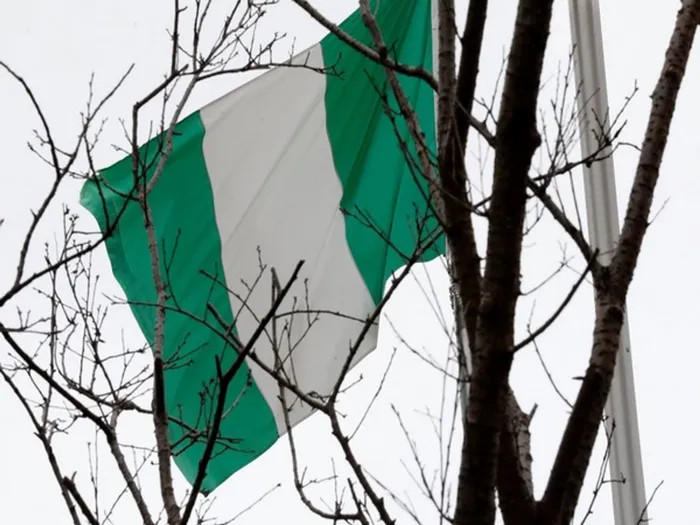As Nigerians head to the polls, let’s remember the legend of national hero Mr Flag

The world will be watching some of the estimated 96.3 million registered voters in Nigeria cast their ballots, say the writers. File picture: Tyrone Siu/Reuters
By Nafissatou Diouf and Gershwin Wanneburg
Michael Taiwo Akinkunmi. Not familiar with that name? Then Mr Flag might ring a bell. If not, let’s take a walk down memory lane to 1959, a year before Nigeria achieved its independence.
A 23-year-old Nigerian engineering student at Norwood Technical College in London had entered a competition to design his young country’s flag after spotting an ad in a newspaper. Months later, the Commissioner for Nigeria in the United Kingdom informed Akinkunmi that his design had been selected, winning him a prize of 100 pounds.
Decades later, in an interview with Al Jazeera, Akinkunmi’s memory appeared somewhat patchy. But the man behind the bi-colour flag vividly recalled the hero’s welcome he received when he returned home in 1964 to find that the British Union Jack had been replaced with his now-famous emblem: two vertical green bands representing Nigeria’s immense natural wealth and a white band symbolising unity and peace.
The two colours will be plastered on ballot boxes all over the country when Nigerians take to the polls on 25 February and 11 March to elect a president and national legislators. But for decades, the story – and the man – behind this powerful symbol of African independence was forgotten by history. It took several more years before Akinkunmi was recognised by the country’s leaders with a presidential award and a lifetime salary of around 800,000 naira or $1,700.
The world will be watching some of the estimated 96.3 million registered voters in Nigeria cast their ballots. To put it into perspective, that’s more than the combined population of Côte d’Ivoire, Ghana, and Cameroon – or Spain and Canada.
Akinkunmi and millions of his countrymen and women will vote for a successor to President Muhammadu Buhari, who is coming to the end of his constitutionally mandated two-term limit. These high-stakes elections will feature prominently on the busy 2023 African electoral calendar, with 11 other presidential polls slated this year.
The main presidential candidates are the ruling All Progressives Congress’ Bola Ahmed Tinubu, Atiku Abubakar of the main opposition People’s Democratic Party and the Labour Party’s Peter Obi. Whoever wins will face the humongous task of tackling competing and pressing priorities in Africa’s most populous nation and largest economy. In an Afrobarometer survey published in September 2022, crime and security ranked as the most important problems that Nigerians want the government to address.
Around 61% of Nigerians said they felt unsafe while walking in their neighbourhoods, and 51% feared crime in their home at least once during the previous year. Both statistics had increased significantly compared to 2015. Meanwhile, 84% of Nigerians surveyed were concerned about abductions and kidnappings.
Whoever triumphs in the elections will do so amid worsening domestic insecurity, including kidnappings in the north west and over a decade-long Islamist insurgency in the north east. Officials of the Independent National Electoral Commission have themselves come under attack. These trends are worrying in a country that is fairly new to peaceful transitions of power, with a history of contested election results.
Fortunately, there are encouraging developments behind all the terrifying headlines. For one, the Electoral Commission is using a verification system that will identify voters through fingerprints and facial recognition in an effort to curb fraud.
In addition, the Covid-19 pandemic has heralded a new era of increased online creativity. The Armed Conflict Location & Event Data Project has partnered with the Centre for Democracy & Development to launch the Nigeria Election Violence Tracker – a dedicated platform for mapping election-related violence and the impact of electoral competition on the country’s multiple concurrent crises.
No doubt, these steps seem small in the bigger scheme of things, but they do represent a move in the right direction. Given its size and stature, what happens in Nigeria will undoubtedly set the tone for the rest of the region. Therefore, we must focus all our energies on supporting this proud nation’s efforts to build on the democratic gains made over the past decade. Other African Nations, like Kenya, have already shown that we can emerge from a wounded past through a free and fair electoral process.
As Nigerians choose a new batch of leaders in the coming weeks, one cannot help but wonder whether the new establishment will prove Mr Flag’s patriotism justified or whether he and the rest of the continent will wake up to an ugly electoral hangover in the wake of this defining moment for Nigeria.
* Nafissatou Diouf is director of communications at Afrobarometer and Gershwin Wanneburg is a freelance writer and editor based in Cape Town.
** The views expressed do not necessarily reflect the views of Independent Media or IOL.